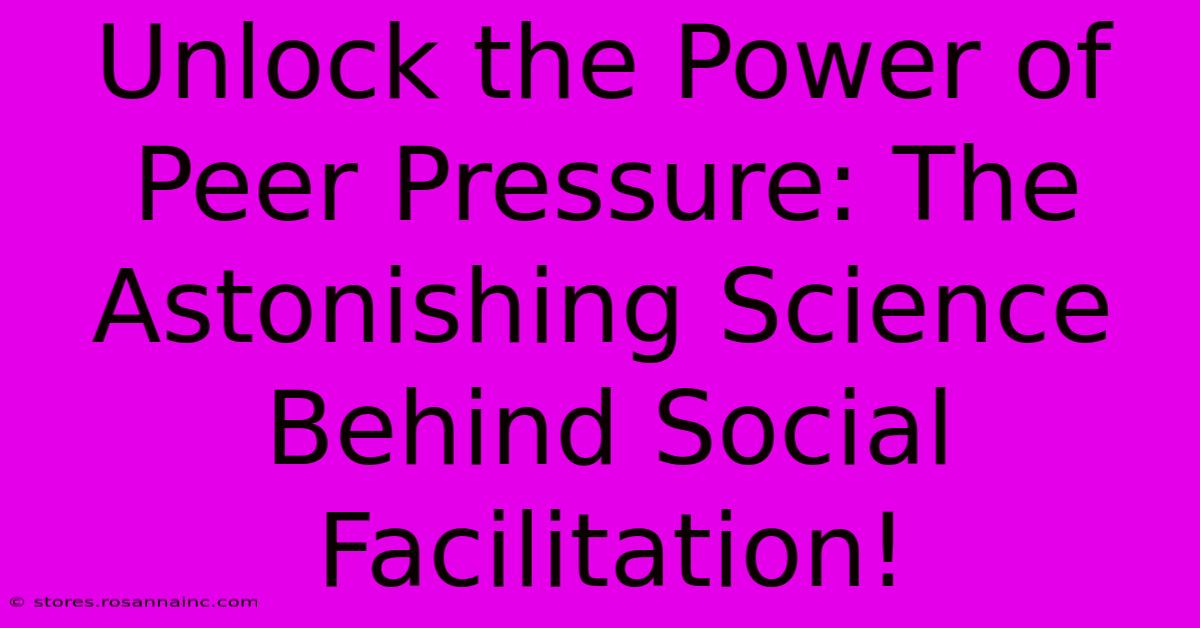Unlock The Power Of Peer Pressure: The Astonishing Science Behind Social Facilitation!

Table of Contents
Unlock the Power of Peer Pressure: The Astonishing Science Behind Social Facilitation!
Peer pressure. The phrase often evokes negative connotations: images of teenagers succumbing to risky behaviors or conforming to unhealthy trends. But the truth is far more nuanced. The influence of others on our actions, a phenomenon known as social facilitation, is a powerful force with both positive and negative implications, deeply rooted in the science of human behavior. This article delves into the astonishing science behind social facilitation, exploring its mechanisms and implications.
Understanding Social Facilitation: More Than Just Peer Pressure
Social facilitation refers to the impact of the mere presence of others on an individual's performance. This presence can either enhance or impair performance depending on the task at hand. It's not just about direct pressure; it's about the subtle, often unconscious, influence of others.
The Zajonc Solution: Arousal and Dominant Responses
The seminal work of Robert Zajonc provided a crucial framework for understanding social facilitation. Zajonc's drive theory proposes that the presence of others increases physiological arousal. This heightened arousal strengthens the individual's dominant response – the most likely reaction in a given situation.
-
Easy Tasks: For simple, well-learned tasks (like riding a bike), the dominant response is usually correct. Increased arousal from the presence of others therefore leads to improved performance.
-
Difficult Tasks: For complex or unfamiliar tasks (like solving a difficult math problem), the dominant response might be incorrect or inefficient. In this case, heightened arousal leads to impaired performance.
The Mechanisms Behind Social Facilitation
Several mechanisms contribute to the effects of social facilitation:
-
Evaluation Apprehension: The fear of being judged by others can significantly impact performance. This is particularly relevant in situations where individuals believe their performance is being assessed.
-
Distraction-Conflict Theory: The presence of others can be distracting, creating a conflict between attending to the task and attending to the audience. This conflict can lead to increased arousal and affect performance.
-
Mere Presence: Even the passive presence of others, without any evaluation or distraction, can influence performance due to heightened arousal.
Social Facilitation in Everyday Life
The implications of social facilitation extend far beyond the psychology lab. Consider these examples:
-
Sports: Athletes often perform better in front of a crowd, demonstrating the positive effects of social facilitation on well-rehearsed skills.
-
Workplace: Collaboration on a straightforward project can boost productivity, while tackling a complex problem in a group may lead to confusion and decreased efficiency.
-
Education: Students might perform better on simple quizzes in a classroom setting, but struggle with complex exams under pressure.
Harnessing the Power of Social Facilitation
Understanding social facilitation allows us to strategically leverage its power:
-
Teamwork: For tasks requiring simple, repetitive actions, teamwork can boost efficiency and productivity.
-
Practice: Mastering skills in private before performing them in public minimizes the negative effects of arousal on complex tasks.
-
Supportive Environments: Creating a supportive and encouraging environment can reduce evaluation apprehension and boost confidence, ultimately improving performance.
Conclusion: Navigating the Complexities of Social Influence
Social facilitation is a powerful force shaping our behavior. While often associated with negative peer pressure, its effects are far more intricate and depend heavily on the task's complexity and the individual's level of preparation. By understanding the underlying mechanisms, we can harness the positive aspects of social influence and mitigate its negative impacts, unlocking the true power of the presence of others. This knowledge enables us to create environments that foster optimal performance and collaboration, leading to enhanced productivity and success in various aspects of life.

Thank you for visiting our website wich cover about Unlock The Power Of Peer Pressure: The Astonishing Science Behind Social Facilitation!. We hope the information provided has been useful to you. Feel free to contact us if you have any questions or need further assistance. See you next time and dont miss to bookmark.
Featured Posts
-
Beyond Human Vision Witness The World Through The Widest Lens
Feb 06, 2025
-
Harmony In Hue Unveiling The Calming Effects Of Pinpurple
Feb 06, 2025
-
Paint Your Nails With The Stars Celestial Hues Reign In Fall 2024
Feb 06, 2025
-
Black Friday Copywriting Magic Craft Headlines That Compel People To Click
Feb 06, 2025
-
The Floral Canvas Transform Your Wedding Tables With Ethereal Centerpieces
Feb 06, 2025
